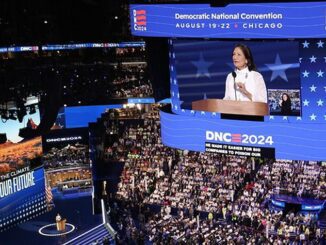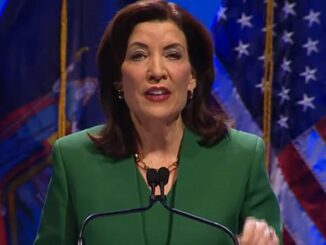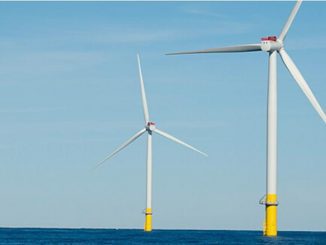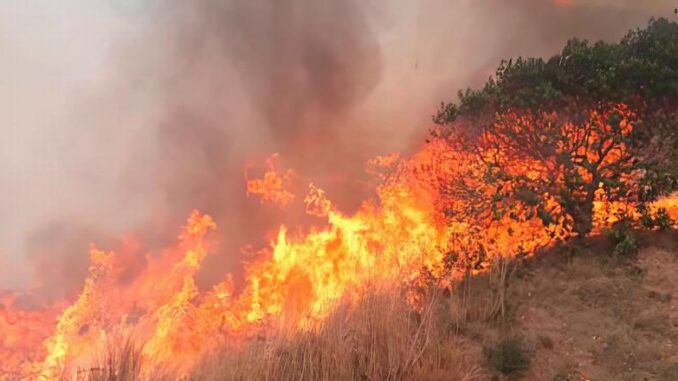
DUBAI, United Arab Emirates, November 30, 2023 (ENS) – “This year’s climate conference comes as the crisis enters a new phase – and shows its full force, harming billions of people, and costing trillions,” UN Climate Change Executive Secretary Simon Stiell declared in a video message to the world Wednesday on the eve of the UN climate summit COP28.
Stiell detailed progress and setbacks in the year since COP27 in Egypt, and set out expectations for COP28, which opened today and runs through December 12 in the gleaming, high-rise city of Dubai.
“COP28 must show a clear agreement to leave fossil fuel dependency behind,” Stiell stressed. “Now everyone is on the frontlines. No country is immune. Yet most governments are still taking baby steps, when bold strides are urgently needed.”
“So – on the eve of the COP28, the problem is clear: business-as-usual is breaking our planet. At the COP28 climate conference, leaders must get to work fixing it,” Stiell urged.
Today, on the opening day of the COP28 UN climate summit, governments formally established a new fund to support vulnerable countries in their efforts to cope with loss and damage due to climate change.
An initial group of countries announced contributions to the Loss and Damage Fund of more than US$400 million: the host United Arab Emirates gave $100 million, Germany also gave $100 million, other European contributions amount to $125 million, the UK contributed the equivalent of US$50.6 million, the United States gave $17.5 million, and Japan put up $10 million.
Joe Thwaites, senior advocate for international climate finance at the U.S. nonprofit Natural Resources Defense Council, called the new fund “an historic achievement.”
“The loss and damage fund will provide urgent assistance to vulnerable communities living on the frontlines of the climate crisis they did little to cause. All wealthy and high-emitting countries now have a responsibility to step up and contribute to the fund,” Thwaites said.
“The fact that governments agreed to the fund at the start of COP cleared the way for world leaders to make ambitious pledges of support. Early contributions ensure the fund gets up and running on its critical mission as soon as possible,” Thwaites explained. “Governments, the private sector, and innovative sources – such as levies on international shipping and aviation emissions – can all contribute to the fund. Fossil fuel companies that have done the most to drive the climate crisis should also contribute, and if they do not do so voluntarily, governments should compel them to.”
President and CEO of the nonprofit World Resources Institute Ani Dasgupta said, “It is very encouraging that some countries stepped forward today with pledges to get the Loss and Damage Fund off the ground. We hope that world leaders will announce additional funds in the coming days. These pledges represent a dramatic turn of events compared to just two years ago when it wasn’t certain if developed countries could ever be convinced to back a Loss and Damage Fund.
“While inadequate to the scale of what is needed, these early contributions will play a critical role in restoring trust between developed and developing countries as the UN climate talks get underway. This progress on loss and damage today is one of many puzzles pieces that need to fall into place for the climate summit to be a success,” Dasgupta said.
Today, in his address to delegates from around the world at the COP28 opening session, Executive Secretary Stiell called for much quicker action. “In humanity’s climate action journey we are taking baby steps. Stepping far too slowly from an unstable world that lacks resilience, to working out the best responses to the complex impacts we are facing.”
“We must teach climate action to run,” urged Stiell. “Because this has been the hottest year ever in humanity. So many terrifying records were broken. We are paying with people’s lives and livelihoods.”
“We’re standing at a precipice. Facing the Global Stocktake. And we’ve got two options.”
“We can note the lack of progress, tweaking our current best practices and encourage ourselves to do more at some other point in time,” Stiell said. “Or, we decide at what point we will have made everyone on the planet safe and resilient. We decide to fund this transition properly including the response to loss and damage, and we decide to commit to a new energy system.”
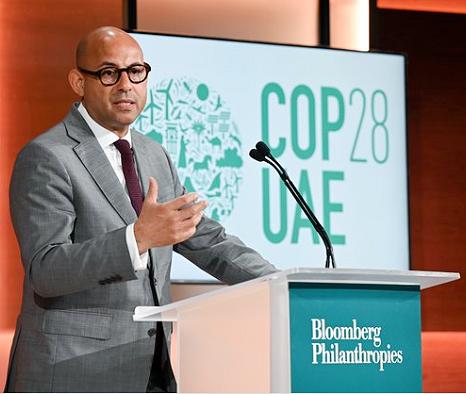
“If we do not signal the terminal decline of the fossil fuel era as we know it, we welcome our own terminal decline. And we choose to pay with people’s lives,” Stiell said in a stern warning before expressing his determination to achieve climate justice.
“If this transition isn’t just, we won’t transition at all,” he said. “That means justice within and between countries. Sharing benefits across society. Ensuring that everyone – women, indigenous peoples and youth, in all their diversity – have equal opportunities to benefit from these transitions.”
“At COP28, governments must deliver on two time frames: a surge in climate action now, and a springboard for next two crucial years, and beyond,” Stiell said. “In Dubai, governments must agree what bolder actions need to be taken and how to deliver them.”
“As leaders leave Dubai after the opening Summit, their message to their negotiators must be equally clear: don’t come home without a deal that will make a real difference,” Stiell said. “They must agree to triple renewable energy this decade, and double energy efficiency.”
“It’s great that over 160 world leaders are coming,” Stiell said, “but COP28 cannot be just a photo-op. Leaders must deliver in Dubai – the message is clear.”
Which World Leaders Are at COP28?
President Joe Biden will not attend the climate summit in Dubai, a White House official said Wednesday, although about 160 other world leaders will be there. Vice President Kamala Harris and U.S. climate envoy John Kerry will lead the U.S. delegation.
While China’s President Xi Jinping will skip it, too, the event is expected to draw leaders of both developed and developing countries: King Charles III, India’s Prime Minister Narendra Modi, France’s President Emmanuel Macron, Crown Prince of Saudi Arabia Mohamed bin Salman, Prime Minister of Barbados Mia Mottley, President of Kenya William Ruto, and Brazil’s President Lula Da Silva all are due to attend.
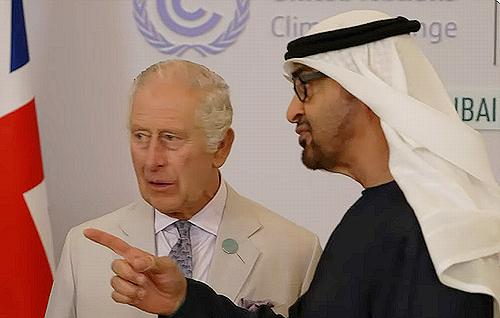
European Commission President Ursula von der Leyen will attend the world leaders summit at COP28 on December 1-2. On Friday in the EU Pavilion, she will host a high-level event on promoting Paris-aligned carbon markets, with the International Monetary Fund, World Bank and World Trade Organisation, as well as a launch event for EU-Catalyst breakthrough energy projects, and an event on the Just Energy Transition Partnership with Vietnam.
On December 2, President von der Leyen will launch the Global Pledge on Renewables and Energy Efficiency together with the COP28 Presidency, aiming to triple installed renewables capacity and double energy efficiency measures by 2030.
She will also speak at the Super-Pollutants Summit, attend the Coal Transition Accelerator initiative event, participate in the Global Stocktake roundtable on Means of Implementation, and deliver the official EU Statement in Plenary, with President of the European Council Charles Michel.
“And COP28 must show a clear agreement to leave fossil fuel dependency behind. Only renewable energy offers safe, affordable, secure energy, as well as far more jobs, stronger economic growth, less pollution and better health for people in every country,” said Stiell, visualizing a cleaner, safer future.
“Finally, he said, “Dubai is an opportunity – and a moment – to build bridges in a fractured world. The climate crisis is hitting every country and every economy; no country alone can fix it. But climate action is a chance to unite around a common cause: survival, justice, prosperity.”
“In short, divisions will destroy us. But solutions can save us. At COP28, it’s time for us all to get to work,” Executive Secretary Stiell concluded.
Financing Climate Work
There will be no confirmation that rich countries have met their $100 billion a year climate finance promise until 2025 at the earliest, Climate Home News reports, quoting an open letter written by ministers from Canada and Germany, the two nations tasked with drawing up the “delivery plan” for belatedly meeting the pledge.
In their open letter, Canada’s Steven Guilbeault and Germany’s Jennifer Morgan, said on Friday that they were “confident that the goal will be met this year.”
That would be three years after the target date of 2020 promised by wealthy nations at climate talks in 2009.
But, the ministers warned, “data on climate finance delivered in 2023 will not be available until 2025 due to data requirements and reporting processes in place.”
A new report from the Organization for Economic Cooperation and Development, OECD, finds that climate finance is on the rise. In 2021, total climate finance provided and mobilized by developed countries for developing countries amounted to US$89.6 billion, showing a significant 7.6 percent increase over the previous year.
Public climate finance – bilateral and multilateral – almost doubled over the 2013-21 period, from US$38 billion to US$73.1 billion, accounting for the majority of the total US$89.6 billion in 2021.
Adaptation finance dropped by US$4 billion (-14 percent) in 2021, resulting in a decrease in its share of total climate finance from 34 percent to 27 percent. At the same time, cross-cutting finance, increased from US$6 billion in 2020 to US$11.2 billion in 2021.
Mobilized private climate finance, for which comparable data are only available from 2016, amounted to US$14.4 billion in 2021, or 16 percent of the total.
First Oil Company CEO to Lead a Climate Summit Stirs Controversy
COP28 President Dr. Sultan Ahmed Al Jaber, who also heads the state-run Abu Dhabi National Oil Co. (ADNOC), is facing dissension over his dual role. On Tuesday, for instance, he had to deny a BBC report alleging that the Emirates planned to discuss oil, gas and renewable energy deals with representatives of at least 15 governments at the annual climate summit.
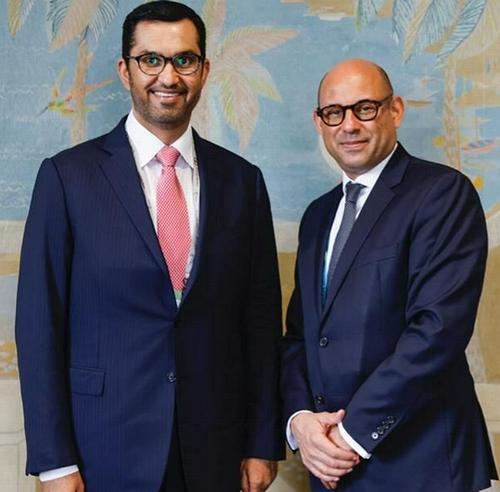
“These allegations are false, not true, incorrect and not accurate,” Al Jaber told journalists assembled for a news conference that was aired live. “I promise you never ever did I see these talking points that they refer to or that I ever even used such talking points in my discussions.”
The UAE team responsible for hosting the conference answered the BBC report with the statement that “private meetings are private.” They declined to discuss the substance of the meetings except to say that the focus was on “meaningful climate action.”
Serving as Minister of Industry and Advanced Technology and the UAE’s Special Envoy for Climate Change, as well as President-designate for the 28th Conference of the Parties to the UN Framework Convention on Climate Change, UNFCCC, Al Jaber has been the public face of the UAE during the run-up to COP28.
In September 2022, speaking at the Bloomberg Emerging + Frontier Forum on the sidelines of the UN General Assembly in New York, Al Jaber offered this insight into his thinking. “The fundamental challenges of the energy transition are as follows,” he said.
- – How to ensure economies move forward, while putting the brakes on emissions.
- – How to maintain energy security and climate progress at the same time.
- – How to make sure that no one gets left behind. I believe we can, we must, and in fact we have no other option, but to solve these challenges together.”
Every year, the country hosting the Conference of the Parties nominates someone to preside over the talks, usually an experienced diplomat. The president-desigate’s nomination is approved by COP delegates as the negotiations begin, usually just a formality. But this year, activists’ anger over al-Jaber’s nomination could get the talks off to a rough start.
Climate campaigners were dissatisfied with Al Jaber’s statement, and expressed doubt that COP28 could be independent from ADNOC, as he heads both organizations.
COP28 Themes Break New Ground
The COP28 Presidency has announced a two-week thematic program, geared towards “real world solutions that close the gaps to 2030.”
The thematic days’ programming incorporates four cross-cutting themes that underpin effective, interconnected delivery: Technology and Innovation, Inclusion, Frontline Communities, and Finance.
The program highlights the sectors and topics raised by stakeholders during consultations, including the themes which need to be part of the COP agenda each year, and new, essential topics like health, trade and relief, recovery, and peace.
Global Stocktake: A World First
The COP28 Presidency and the delegates attending COP28 will also respond to the first Global Stocktake, which the UN Climate Change agency, UNFCCC, defines as “a moment to take a long, hard look at the state of our planet and chart a better course for the future.”
The Global Stocktake is a five-yearly checkpoint that was established in the 2015 Paris Agreement, with the first stocktake set to conclude at COP28.
Issued in October 2023, the preliminary technical Global Stocktake found that, “The world is not on track to limiting temperature rise to 1.5°C by the end of this century. It does recognize that countries are developing plans for a net-zero future, and the shift to clean energy is gathering speed, but it makes clear that the transition is nowhere near fast enough yet to limit warming within the current ambitions.”
At COP28, the findings of the technical assessment will be discussed by negotiators, ministers and heads of state. Key political messages will be summarized, and opportunities for enhancing action and financial and technical support identified.
This phase was organized by COP28 President Al Jaber, supported by two co-facilitators who conduct political consultations with parties of the negotiations. To support the ongoing negotiations process on the Global Stocktake in this role, Al Jaber has named Barbara Creecy, Minister of Environment, Forestry and Fisheries of South Africa, and Dan Jorgensen, Minister for Development Cooperation and Global Climate Policy of Denmark.
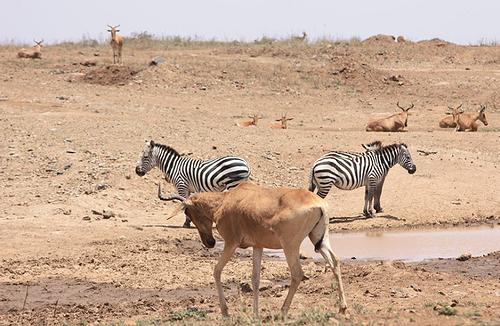
The outcome will be published at the end of COP28. The official “cover decision” of the COP, negotiated by all parties, could detail how the outcomes of the Global Stocktake will be activated.
Published by UN Climate Change, the technical Global Stocktake report shows that national climate action plans, known as nationally determined contributions, would collectively lower greenhouse gas emissions to two percent below 2019 levels by 2030. But the science is clear that a 43 percent reduction is needed.
The Global Stocktake, driven by Parties to the UN Framework Convention on Climate Change, UNFCCC, with the participation of non-Party stakeholders, “enables countries and other stakeholders to see where they’re collectively making progress toward meeting the goals of the Paris Agreement – and where they’re not.”
“It’s like taking inventory. It means looking at everything related to where the world stands on climate action and support, identifying the gaps, and working together to agree on solutions pathways (to 2030 and beyond),” the UNFCCC says.
Fossil Fuel Phase Out Divides Participants
COP28 takes place as the world sets a record for the hottest year ever in 2023. A decision governments could make in Dubai is whether to agree, for the first time, to phase out global consumption of fossil fuels like coal, oil and gas and replace them with renewable energy sources such as solar, wind and geothermal.
Many climate advocates and campaigners want the final Global Stocktake to support a fossil fuel phase out.
Ahead of COP28, 204 companies representing over US$1.5 trillion in global annual revenue are urging national governments to address the primary cause of climate change: burning fossil fuels.
A letter https://www.wemeanbusinesscoalition.org/cop28-businesses-urge-governments-to-phase-out-fossil-fuels/to governments was coordinated by We Mean Business Coalition and its partners through the Fossil to Clean campaign. It states, in part, “Our businesses are feeling the impacts and cost of increasing extreme weather events resulting from climate change. We recognize the need to transition in a way that safeguards our future collective prosperity on a livable planet. That means reducing our emissions, adopting clean solutions and reducing our use of fossil fuels to limit global heating in line with the Paris Agreement’s ultimate goal of 1.5°C.”
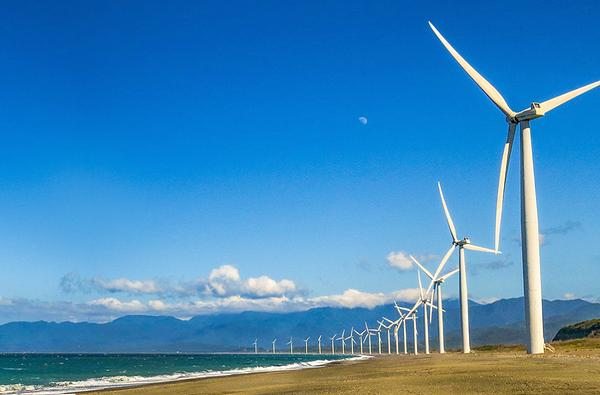
“We call on all Parties attending COP28 in Dubai to seek outcomes that will lay the groundwork to transform the global energy system towards a full phase-out of unabated fossil fuels and halve emissions this decade. This can be enabled by agreeing to a global target of tripling renewable electricity capacity to at least 11,000 GW and doubling the rate of deployment of energy efficiency by 2030,” the Coalition letter states.
“Unabated fossil fuels refers to fossil fuels produced and used without interventions that substantially reduce the amount of GHG emitted throughout the life-cycle; for example, capturing 90 percent or more from power plants, or 50-80 percent of fugitive methane emissions from energy supply,” the Coalition says.
Developing countries have been trying for years to get agreement to a fossil fuel phase out from the UN climate talks. This week that effort received more support as the European Union Parliament passed a resolution agreeing upon a fossil fuel non-proliferation treaty and calling for a “tangible phase-out of fossil fuels as soon as possible.”
“Fossil fuel emissions are responsible for over 80 percent of global emissions and the bloc’s current subsidy regime has been funding the sector to the tune of €55-58 billion per year, every year since 2008,”
The resolution, passed November 23, outlines the position of elected European Union lawmakers going into COP28 and could help ensure that negotiators focus on a phaseout at the negotiations beginning Nov. 30 in Dubai, where climate finance, and a global stocktake of climate actions since the Paris Agreement, are also key agenda items.
The EU Parliament resolution says phasing out fossil fuels is the only way to still meet the Paris Agreement goal of limiting global warming to 1.5 degrees Celsius above preindustrial levels. It also calls for “halting all new investments in fossil fuel extraction,” and for the parties at COP28 to work on developing a fossil fuel non-proliferation treaty to augment the non-binding United Nations climate convention.
“With world leaders such as the US and China opposed to such an agreement, it will be interesting to see how the negotiations play out,” the parliament said in a statement.
Last year, at COP27, India proposed to expand a previously agreed phase down of coal to include oil and gas. Although was supported by at least 80 countries, the proposal did not make it into the final agreement.
Nevertheless, at the UNFCCC talks in Bonn, Germany in June, the COP28 president-designate Al Jaber said that a fossil fuel phase down is “inevitable.”
The European Union Parliament’s position emphasized concern that the United Arab Emirates named the head of the state oil company Abu Dhabi National Oil Company Group, ADNOC, Sultan Al Jaber, as the chair of COP28, and said there were concerns about conflict of interest.
“This is due to reports that a dozen employees of the COP28 team have direct links with the fossil fuel industry, and suggestions that ADNOC employees have been able to read emails to and from the COP28 climate summit office and were consulted on how to respond to media inquiries,” the UK news outlet SG Voice reports.
World Leaders to Gather This Weekend
The World Climate Action Summit, WCAS, hosted by His Highness Sheikh Mohamed bin Zayed Al Nahyan, President of the United Arab Emirates, will convene Heads of State or Government on December 1-2, when the first part of the COP28 high-level segment also will take place. A resumed high-level segment will take place on December 9-10.
The WCAS provides Heads of State or Government with the opportunity to set the stage for COP28, build on decisions from previous Conferences of the Parties, raise climate commitments and promote coordinated action to tackle climate change.
The COP28 Presidency will hold open consultations on thematic areas, adding that it invites “inputs from the broad mix of stakeholders attending the conference.”
Please use the sharing tools found via the share button at the top or side of articles. Copying articles to share with others is a breach of FT.comT&Cs and Copyright Policy. Email licensing@ft.com to buy additional rights. Subscribers may share up to 10 or 20 articles per month using the gift article service. More information can be found here.
https://www.ft.com/content/fbe6e38b-4808-480a-ab20-9379fc2a91fd
The United Arab Emirates is preparing to launch a US$30 billion climate-related investment fund with BlackRock, TPG and Brookfield, the “Financial Times” reports today, citing people familiar with the matter.
Lunate Capital, a new Abu Dhabi-based asset manager with US$50 billion in assets, will oversee the fund with at least $5 billion earmarked for investment in countries in the Global South.
To make the fund function, the UAE is drawing on resources gathered as one of the world’s biggest oil and gas producers. The UAE has assets worth US$2.5 trillion across its sovereign wealth fund, pension funds and central bank, according to data provider Global SWF.
COP28 President Sultan al-Jaber has often said that climate finance would be a key focus for the COP28 summit,
Some Countries Limited Fossil Fuel Extraction This Year
In August, Ecuadorians voted in a landmark referendum to halt the development of all new oil wells in the Amazon’s biodiverse Yasuní National Park. At a time when the climate crisis is intensifying and the Amazon rainforest is approaching an irreversible tipping point, Ecuador has become one of the world’s first countries to limit fossil fuel extraction at the ballot box
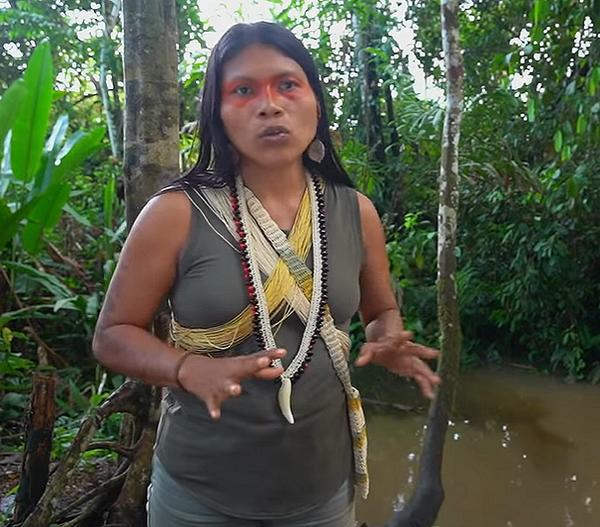
The vote will keep about 726 million barrels of oil in the ground in Yasuní National Park, which is home to the Tagaeri and Taromenane people, two of the world’s last Indigenous groups living in voluntary isolation from other cultures.
Nemonte Nenquimo, an Indigenous Waorani leader and a 2020 winner of the Goldman Environmental Prize, said after the vote was tallied, “Today is a historic day! As a Waorani woman and mother, I feel overjoyed with Ecuadorians’ resounding decision to stop oil drilling in my people’s sacred homeland,” reported “The Guardian” newspaper.
Nenquimo led an Indigenous campaign and legal action that resulted in a court ruling protecting 500,000 acres of Amazonian rainforest and Waorani territory from oil extraction.
Nenquimo’s leadership and the lawsuit set a legal precedent for indigenous rights in Ecuador, and now other tribes are protecting additional tracts of rainforest from oil development.
Scientists Issue More Warnings
The International Cryosphere Climate Initiative, a group of scientists who study ice-covered parts of the world, warns that a rise of 2°C would liquidate most tropical and mid-latitude glaciers and set off long-term melting of the Greenland and Antarctic ice sheets, leading to 12 to 20 metres (39 to 65 feet) of sea level rise.
In the 2015 Paris Agreement, all countries committed to holding global average temperature to “well below 2°C” over pre-industrial levels and “pursuing efforts” to limit it to 1.5°C. Our still-rising greenhouse gas emissions have already caused almost 1.2°C of warming and put us on track to exceed 3°C.
More than 350 cryosphere scientists have signed an open letter calling on governments to commit to the 1.5°C limit at the COP28 climate summit.
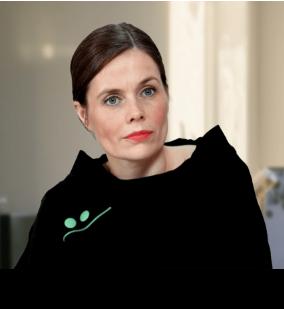
Iceland’s Prime Minister Katrín Jakobsdóttir agrees. “From the cryosphere point of view, 1.5°C is not simply preferable to 2°C or higher. It is the only option,” she declared.
Scientists at Japan’s Hiroshima University have created a framework to guide development and assessment of urban climate action plans and help local governments adapt to the threats of climate change. These scientists say that due to a high concentration of people and activities, cities are at the forefront of battle against climate change.
More than half of the world’s population resides in urban areas, and this number continues to rise. At the same time, urban areas are the most vulnerable to the changing climate and its associated heatwaves, droughts, floods, storm surges, sea level rise and other natural hazards.
Cities are responsible for over 70 percent of global greenhouse gas emissions and consume more than two-thirds of the world’s energy. Scientists know that it is necessary to move beyond the “business as usual” approach to achieving sustainable urban development.
With the world projected to be highly urbanized by 2050, cities are encouraged to take urgent climate actions now to mitigate and adapt to the dangers of climate change. As climate change intensifies and urbanization increases, local governments are expected to lead climate action planning. Yet studies show the limitations of existing climate action plans.
To fill this gap, scientists from Hiroshima University have created an Urban Climate Action Planning, UCAP, framework to guide the development of urban climate action plans, or CAPs and support suitability assessments of these plans.
Their framework was published as a critical review in the journal “Renewable and Sustainable Energy Reviews” on October 22, 2023.
The ultimate scientific authority, the UN’s Intergovernmental Panel on Climate Change, IPCC, is planning a strong presence at COP28.
IPCC Chair Jim Skea of Scotland, formerly a professor of sustainable energy at Imperial College London from 2009 to 2023, was part of an IPCC working group on climate change mitigation from 2015 to 2023. He provided scientific leadership for the IPCC Special Report on Global Warming of 1.5°C.
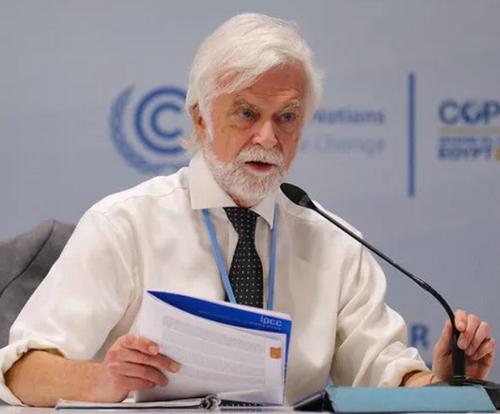
Focused on energy, climate change and technological innovation, Professor Skea addressed the COP28 high-level opening today. “IPCC’s scientific assessments are ever clearer and more certain about climate change, its impacts and future risks, and options for adaptation and mitigation,” he told delegates.
“Our planet has warmed by more than one degree Celsius since the preindustrial era, as the result of burning fossil fuels, deforestation, and unsustainable use of resources,” he warned.
“Human activity has led to changes to Earth’s climate of a magnitude unprecedented over centuries and thousands of years. Climate impacts, some of them irreversible, are widespread, rapid and intensifying, from the poles to the tropics, from the mountains to the oceans,” Skea reminded the attendees.
“Without immediate and deep emissions reductions across all sectors, we will not meet the goals of the Paris Agreement. The UNEP Gap Report released a few days ago shows that we are headed towards global warming of three degrees Celsius if we carry on with current policies. And let us not forget gaps in terms of adaptation and financing,” he said before pivoting to focus on “promising signs of climate action.”
“In some countries. there have been sustained emissions reductions. These have helped to bend the rising trend in emissions globally. In the past decade, there have been sustained decreases in the costs of renewable energy,” Skea said hopefully.
“Our assessments have identified multiple options to reduce greenhouse gas emissions and adapt to climate change. These can be implemented right now. But they need to be scaled up and mainstreamed through policies and increased financing,” he urged.
In less than two months, the IPCC’s 195 member governments will take decisions on the Programme of Work for the rest of this decade. “Our aspiration is to make effective use of the best available science to deliver focused, policy-relevant reports, and to do so in an inclusive fashion that represents all perspectives,” Skea told COP28’s opening session.
On December 4, the IPCC will host an official UNFCCC side event on the findings of its Sixth Assessment Report in the context of recent developments.
The IPCC is now gearing up for the seventh assessment cycle. Panelists at the side event will look ahead to the scientific challenges of the upcoming assessment cycle.
Also on December 4, the IPCC’s Task Force on National Greenhouse Gas Inventories, together with the UNFCCC Secretariat and other partners, will host a side event on key tools such as software supported by the UNFCCC to strengthen the Enhanced Transparency Framework of the Paris Agreement.
Throughout COP28, the IPCC will run a pavilion named “Science for Climate Action” with a full program of scientific panels and events. The IPCC pavilion will feature IPCC partners the World Meteorological Organization, and the MERI Foundation, which carries out scientific research and environmental education for the conservation of the strategic ecosystems of three elemental reserves in Chile, and other partners.
Detailed information about the IPCC events at COP28 pavilion and livestreaming is online here.
Skea concluded, “As the Chair of the IPCC, I can reassure you that the scientific community is poised, using the resources available to it, to support the outcomes of COP 28 in shaping climate action based on science. But let us recall, science by itself is no substitute for action.”
Featured image: Wildfire in the Alturas de Santa Clara mountains, adjacent to the city of Santa Clara, Cuba, engulfed the national radio and television station. April12, 2023 (Photo by lezumbalaberenjena)

